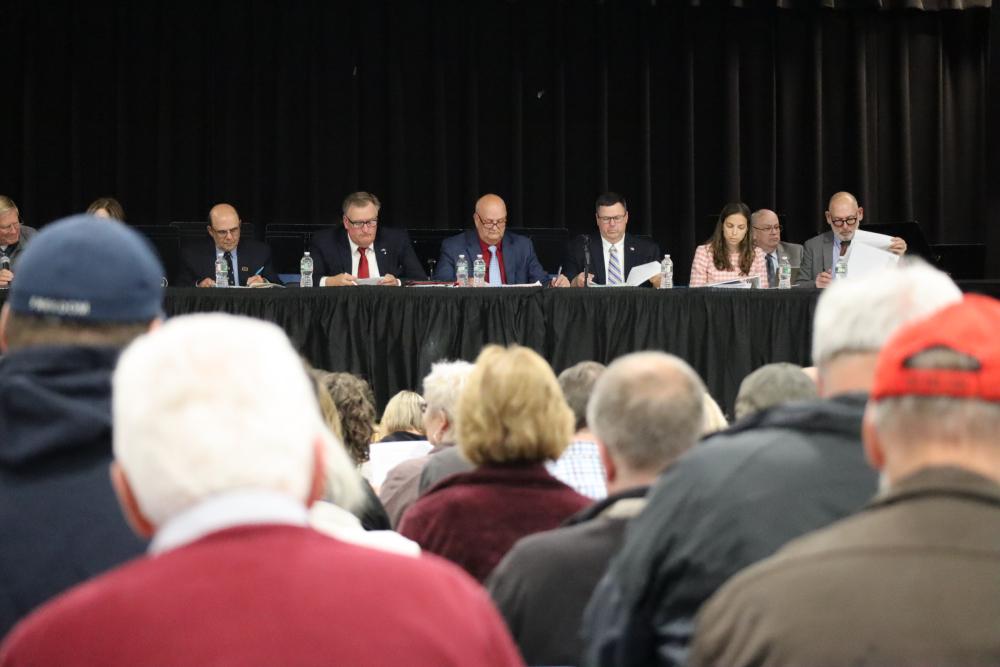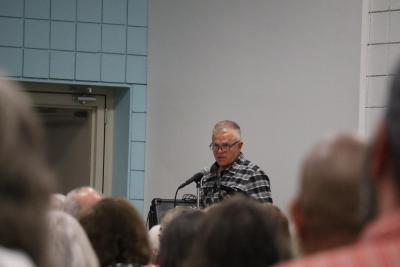Rochester voters leave ‘Green Communities’ program, first in state
ROCHESTER — The auditorium at Rochester Memorial School was nearly overflowing with voters who had their say on 32 items on the 2024 Spring Town Meeting agenda on Monday, May 22.
All but one item was passed by the town.
Rochester became the first municipality in Massachusetts to vote to leave the “Green Communities” program.
This affirmative vote was met with applause from the majority of the voters in attendance.
Rochester originally voted to become a Green Community during a Nov. 19, 2018 Special Town Meeting.
“When they sold it to us in 2018, it did not affect renovations on your current properties,” said Rochester Select Board member Brad Morse. “Also we are looking at possibly a new fire station and renovations to the police station [and] it will affect the cost of that big time.”
A Green Community has to meet certain criteria which includes creating a plan to reduce energy use by 20% within five years and adopting a fuel efficient vehicle purchase policy.
Additionally, Green Communities must adopt the “Stretch Code,” a specialized and more strict building-energy code that “emphasizes energy performance,” according to the Massachusetts Department of Energy Resources.
In return for following these guidelines, a Green Community is eligible for state-funded grants. So far, said Green Communities Regional Coordinator Lisa Sullivan at an April 10 meeting, Rochester has received $425,505 in grant funding.
However, the requirements of the “Stretch Code,” which aim to improve buildings’ energy efficiency, can be more expensive and extensive than what is required in standard state building codes.
These added costs were a driving force behind efforts to leave the Green Communities program.
“It’s important for us to withdraw from the Green Communities and associated Stretch Codes because it's no longer a question of making environmental improvements and protecting the Earth,” said Rochester Planning Board member Ben Bailey. “It’s a question of reality versus lunacy and overbearing governmental abuse of our pocketbooks.”
Arnie Johnson, who serves as the chair of the Rochester Planning Board and Public Safety Facility Feasibility Study Committee, said that leaving the Green Communities program — and therefore abandoning the state’s “Stretch Codes” — could save a “significant” amount of money on municipal building projects.
He pointed to the proposed plan to renovate the current police station on Dexter Lane, and build a new fire station and fire substation that could cost $37 million as an example.
During a March 14 meeting of the Rochester Public Safety Facility Feasibility Study Committee, architect Ted Galante, who is overseeing the proposed project, said that there are “a lot of elements that are Green Community-related that have an impact on the cost of construction.”
“All this stuff adds up,” said Johnson, referring to extra insulation and triple-paned windows that would be required in a Stretch Code-compliant public safety building. “If you’re talking about a building, or multiple buildings … when you’re talking multi-million dollars, the savings, if we get out of the stretch code, are going to be significant.”
“Stretch Code” requirements can also impact new residential construction and some additions and renovations on existing buildings.
According to Rochester Select Board member Woody Hartley, he originally brought the Green Communities program to the town’s attention “years ago” but after an April 10 presentation from Green Community Program experts, he had his doubts.
“I was greatly disappointed by the experts, they had no answers,” said Hartley. “And the most common thing we heard when some very good questions were asked was ‘it’s complicated.’”
Item 32 on the Rochester Town Meeting Agenda was a citizens petition to withdraw from the Green Communities Program and associated Stretch Codes.
Bailey, who proposed the petition, motioned to remove it from the agenda, thanking the town for its affirmative vote on Item 27.
“Rochester is a great community, we’re smart people and we know when we’re being taken,” said Bailey. “Somebody has to be first, and somebody has to have the courage to be first.”















